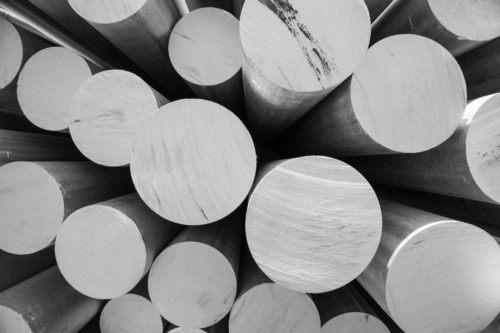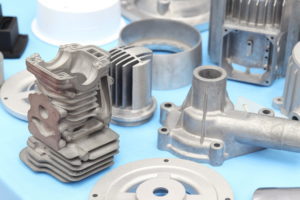How Stahl Specialty Company can Save You Time, Stress, and Money.
How Stahl Specialty Company can Save You Time, Stress, and Money.
Blog Article
Things about Stahl Specialty Company
Table of ContentsExamine This Report on Stahl Specialty CompanyStahl Specialty Company Can Be Fun For AnyoneThe Of Stahl Specialty CompanyThe Single Strategy To Use For Stahl Specialty CompanyWhat Does Stahl Specialty Company Do?
The refined distinction lies in the chemical content. Chemical Comparison of Cast Light weight aluminum Alloys Silicon promotes castability by lowering the alloy's melting temperature level and boosting fluidity during spreading. It plays a critical duty in permitting detailed mold and mildews to be filled up accurately. Additionally, silicon adds to the alloy's toughness and use resistance, making it important in applications where sturdiness is vital, such as vehicle parts and engine parts.It likewise boosts the machinability of the alloy, making it simpler to refine into completed items. By doing this, iron contributes to the total workability of aluminum alloys. Copper boosts electrical conductivity, making it beneficial in electric applications. It additionally improves deterioration resistance and adds to the alloy's general toughness.
Manganese contributes to the stamina of aluminum alloys and enhances workability. It is commonly made use of in functioned aluminum items like sheets, extrusions, and profiles. The visibility of manganese aids in the alloy's formability and resistance to breaking during construction procedures. Magnesium is a lightweight aspect that gives toughness and influence resistance to aluminum alloys.
Zinc enhances the castability of light weight aluminum alloys and assists control the solidification process throughout spreading. It boosts the alloy's strength and firmness.
The Of Stahl Specialty Company
Because aluminum-silicon alloys have great spreading properties, high gas residential or commercial properties, easy procedures, and superb corrosion resistance, aluminum-silicon alloys are most typically made use of in the die-casting market in the house and abroad. At the exact same time, aluminum-silicon alloys are also reasonably very early and extensively acknowledged alloys established and utilized in die-casting. After continuous study and renovation, the majority of the existing global mainstream aluminum-silicon alloys have actually been finalized and are absolutely nothing greater than A356, A360, A380, ADC12, B390, and A413.
The primary thermal conductivity, tensile toughness, return toughness, and elongation vary. Amongst the above alloys, A356 has the highest thermal conductivity, and A380 and ADC12 have the lowest.

10 Simple Techniques For Stahl Specialty Company
In accuracy spreading, 6063 is appropriate for applications where elaborate geometries and high-quality surface area finishes are paramount. Instances include telecommunication enclosures, where the alloy's remarkable formability enables smooth and aesthetically pleasing layouts while keeping structural honesty. In a similar way, in the Lighting Solutions industry, precision-cast 6063 components create classy and reliable lighting fixtures that require intricate forms and good thermal efficiency.
(https://www.pinterest.com/pin/1108589264525265586)
The A360 displays exceptional elongation, making it excellent for complex and thin-walled elements. In accuracy casting applications, A360 is appropriate for markets such as Consumer Electronic Devices, Telecommunication, and Power Devices.

In precision casting, aluminum 413 radiates in the Consumer Electronics and Power Devices industries. This alloy's premium rust resistance makes it an excellent selection for outside applications, making sure resilient, sturdy products in the pointed out markets.
The 10-Second Trick For Stahl Specialty Company
The aluminum alloy you select will significantly affect both the spreading procedure and the residential or commercial properties of the final product. Due to the fact that of this, you need to make your choice very carefully and take an educated technique.
Figuring out the most appropriate aluminum alloy for your application will indicate considering a vast selection of qualities. The very first category addresses alloy features that influence the manufacturing procedure.
The alloy you select for die casting directly impacts several facets of the spreading procedure, like exactly how very easy the alloy is to deal with and if it is susceptible to casting defects. Warm fracturing, also referred to as solidification splitting, is a typical die spreading flaw for light weight aluminum alloys that can lead to internal or surface-level rips or splits.
The 5-Minute Rule for Stahl Specialty Company
Particular light weight aluminum alloys are extra prone to warm splitting than others, and your option must consider this. An additional common problem located in the die spreading of aluminum is die soldering, which is when the cast stays with the die wall surfaces and makes ejection difficult. It can harm both the cast and the die, so you should seek alloys with high anti-soldering residential properties.
Rust resistance, which is already a notable quality of aluminum, can differ substantially from alloy to alloy and is a necessary characteristic to take into consideration depending upon the environmental conditions your item will certainly be revealed to. Use resistance is another residential property frequently looked for in aluminum items and can distinguish some alloys.
Report this page